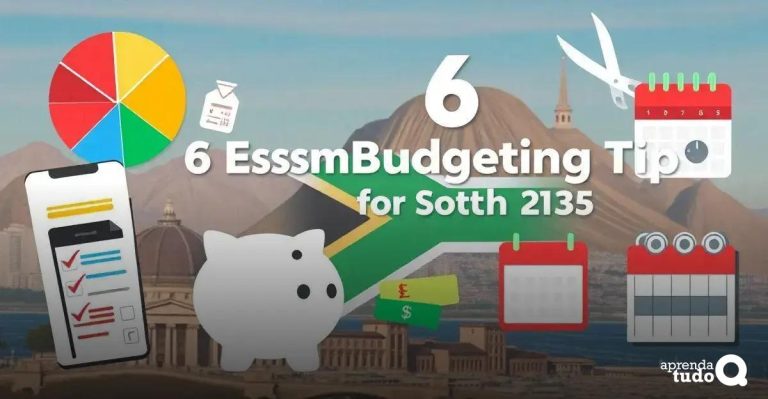Budgeting remains a vital skill for many South Africans as the economy fluctuates.
With effective budgeting tips for South Africa, households can better manage their finances, preparing for unexpected expenses, and saving for future goals.
In this article, we’ll explore practical advice tailored to our unique financial landscape so you can take control of your money with confidence.
Understanding Your Income Sources
Understanding your income sources is the first step in crafting a solid budget. It’s crucial to have a clear picture of where your money is coming from so you can plan effectively. Start by listing all your income streams, which might include:
- Your Salary: This is typically your primary source of income. Be sure to consider any deductions from taxes and other contributions.
- Side Hustles: Many South Africans supplement their income through part-time work or freelance jobs. Don’t forget to include any money earned from these activities.
- Investments: If you own shares, dividends, or rental properties, calculate the income generated from these sources. Passive income is a vital aspect of a robust budget.
- Government Benefits: For those eligible, include any government assistance or grants that provide financial support.
Once you’ve detailed your income, calculate your total monthly income. This figure will become the foundation of your budgeting efforts. Remember, the goal is to have a realistic view of your financial landscape, which empowers you to make informed decisions. Moreover, it can also help highlight opportunities for additional income streams, such as educational investments or skill development, which can lead to better job prospects and higher earnings in the long run.
Tracking Your Expenses
![]()
Tracking your expenses is a vital component of successful budgeting. By knowing exactly where your money is going each month, you can make informed decisions about your spending habits. Here’s how to effectively track your expenses:
- Keep Receipts: Start by saving all your receipts. They will provide a clear record of your purchases, making it easier to categorise your spending later on.
- Use a Budgeting Tool: There are various budgeting apps and tools available that can help you monitor your expenses. Choose one that suits your style—some allow you to manually enter expenses, while others can sync with your bank account.
- Create Expense Categories: Break down your spending into categories such as groceries, transport, entertainment, and utilities. This categorisation allows you to spot trends and identify areas where you might be overspending.
- Review Monthly Statements: At the end of each month, review your bank and credit card statements. This step will help you verify your data and catch any errors or forgotten purchases.
- Set Aside Time for Tracking: Make it a habit to review your spending weekly or bi-weekly. This regular check-in makes the process less overwhelming and keeps your budget on track.
As you start tracking, you may discover some patterns in your spending that you weren’t aware of—like monthly subscriptions eating away at your budget. The goal is to gain insight into your financial habits so you can adjust and make smarter financial choices moving forward.
Setting Realistic Savings Goals
Setting realistic savings goals is essential for maintaining a healthy budget and ensuring your financial security. Here’s how to establish achievable savings milestones:
- Assess Your Financial Situation: Before setting savings goals, take a close look at your income, expenses, and current savings. Understanding your financial situation will help you determine how much you can realistically set aside each month.
- Define Your Goals: Think about what you’re saving for—whether it’s an emergency fund, a holiday, or a deposit for a home. Be specific about your goals; for instance, instead of saying you want to save for a holiday, set a target amount and timeline, like “I want to save R10,000 within the next 12 months for a trip to the coast.”
- Break It Down: Divide your savings goal into smaller, manageable targets. For example, if your aim is to save R10,000 in a year, you’ll need to save approximately R833 each month. This breakdown makes the goal feel less daunting and more attainable.
- Prioritise Your Goals: You might have multiple savings goals at once. Prioritise them based on urgency and importance. Focus on building an emergency fund first, then move on to other goals like travel or larger purchases.
- Review and Adjust: Life changes, and so do your financial circumstances. Regularly review your savings goals and make adjustments as necessary. If you receive a bonus, consider allocating a portion of it toward your savings goals or if you encounter unexpected expenses, you may need to lower your monthly target temporarily.
By setting realistic savings goals and taking a consistent approach towards achieving them, you’ll find you can build financial stability without feeling deprived. Plus, reaching those milestones is incredibly satisfying and motivates you to keep saving!
Utilising Budgeting Apps

Utilising budgeting apps can revolutionise the way you manage your finances, making the budgeting process more convenient and effective. Here’s how to get the most out of these digital tools:
- Choose the Right App: With so many budgeting apps available, it’s essential to pick one that suits your needs. Look for features that matter most to you, such as expense tracking, bank syncing, categorisation, and visual reports. Popular options like YNAB, GoodBudget, and MoneySmart can offer different functionalities to explore.
- Easily Track Spending: Most budgeting apps allow you to input your expenses in real-time or automatically sync with your bank account. This can save you time and help you keep a clear record of your spending throughout the month.
- Set and Monitor Budgets: Once you’ve chosen your app, you can set specific budgets for each category, such as groceries, entertainment, and transport. The app will often alert you when you’re nearing your limit, helping you stay on track.
- Visualise Your Progress: Many apps come with graphs and charts that visually represent your spending and saving patterns. This visual feedback can help you identify trends, celebrate achievements, and motivate adjustments to your budget as needed.
- Automate Savings: If the app allows, consider setting up automatic transfers to your savings goals. This way, you can save without even thinking about it! Automating this process makes it less likely you’ll skip a month unintentionally.
- Stay Engaged: Regularly interacting with your budgeting app is key. Try logging in at least once a week to review your progress, make adjustments, and keep your budgeting goals fresh in your mind.
Overall, leveraging budgeting apps can simplify your financial management process, allowing for smarter spending and a clearer path toward meeting your financial goals.
Cutting Unnecessary Expenses
Cutting unnecessary expenses is a powerful way to free up more money in your budget, allowing you to allocate funds towards savings or essential needs. Here are some practical strategies for identifying and eliminating these expenses:
- Review Your Subscriptions: Take a close look at all your recurring subscriptions, whether it’s gym memberships, streaming services, or magazine subscriptions. Are you actively using these services? Consider cancelling any that you don’t frequently use or find value in.
- Evaluate Dining Out: While dining out is enjoyable, it can quickly eat into your budget. Set a monthly limit on how much you spend on restaurants and try to stick to it. Additionally, consider cooking at home more often, as it’s usually cheaper and can be a fun activity.
- Shop Smart: Before heading to the shops, create a shopping list to avoid impulse purchases. Stick to your list and take advantage of sales or discounts, but only for items that you genuinely need. Planning meals can also help reduce grocery costs.
- Cut Transportation Costs: If possible, consider using public transport, walking, or cycling instead of driving everywhere. Not only can this save on petrol and parking fees, but it also benefits your health. If you must use a car, think about carpooling or ride-sharing with friends when feasible.
- Limit Entertainment Expenses: Entertainment costs can add up quickly. Instead of expensive outings, look for free or low-cost entertainment options in your community, such as local events, public parks, or movie nights at home.
- Identify Other Unnecessary Items: Take stock of any non-essential items you purchase regularly, such as fancy coffees or branded snacks. These small purchases often go unnoticed but can significantly impact your budget. Challenge yourself to cut back on these luxuries.
By critically assessing your spending habits and implementing these strategies, you can effectively reduce unnecessary expenses. The result? More flexibility in your budget, increased savings, and the satisfaction of managing your finances more wisely!
Reviewing and Adjusting Your Budget Regularly

Reviewing and adjusting your budget regularly is essential for maintaining its effectiveness and ensuring it adapts to your changing financial situation. Here’s how to make this process meaningful:
- Schedule Regular Check-Ins: Set specific times each month to review your budget. This could be at the end of each month or the beginning of a new one. By scheduling these sessions, you’re more likely to stick with them and make them a habit.
- Assess Your Spending Patterns: During your review, compare your actual spending against your budgeted amounts. Look for areas where you overspend or underspend. This analysis will help you identify trends and understand your financial behaviour better.
- Adjust for Changes: Life happens—unexpected expenses or changes in income can affect your budget. Be flexible and willing to adjust your budget to accommodate these changes. If your expenses have increased in a particular category, it’s okay to tweak your budget for the upcoming month.
- Celebrate Your Successes: Take a moment to acknowledge any financial goals you’ve achieved, whether it’s saving a certain amount or staying within your budget for a month. Recognising these successes can boost your motivation to keep going.
- Set New Goals: As you review your budget, think about any new financial goals you want to set. Whether that’s creating an emergency fund, saving for a holiday, or paying down debt faster, updating your budget to reflect these goals will help keep you focused.
- Involve the Family: If you’re managing a household budget, involve your family in the review process. Encourage open discussions about finances, allowing everyone to voice their opinions and concerns. This can lead to more cohesive financial planning and shared responsibility.
By regularly reviewing and adjusting your budget, you make sure that it remains a useful tool rather than a rigid plan. Staying engaged with your finances helps you navigate changes more effectively, enabling you to take control of your financial future.






